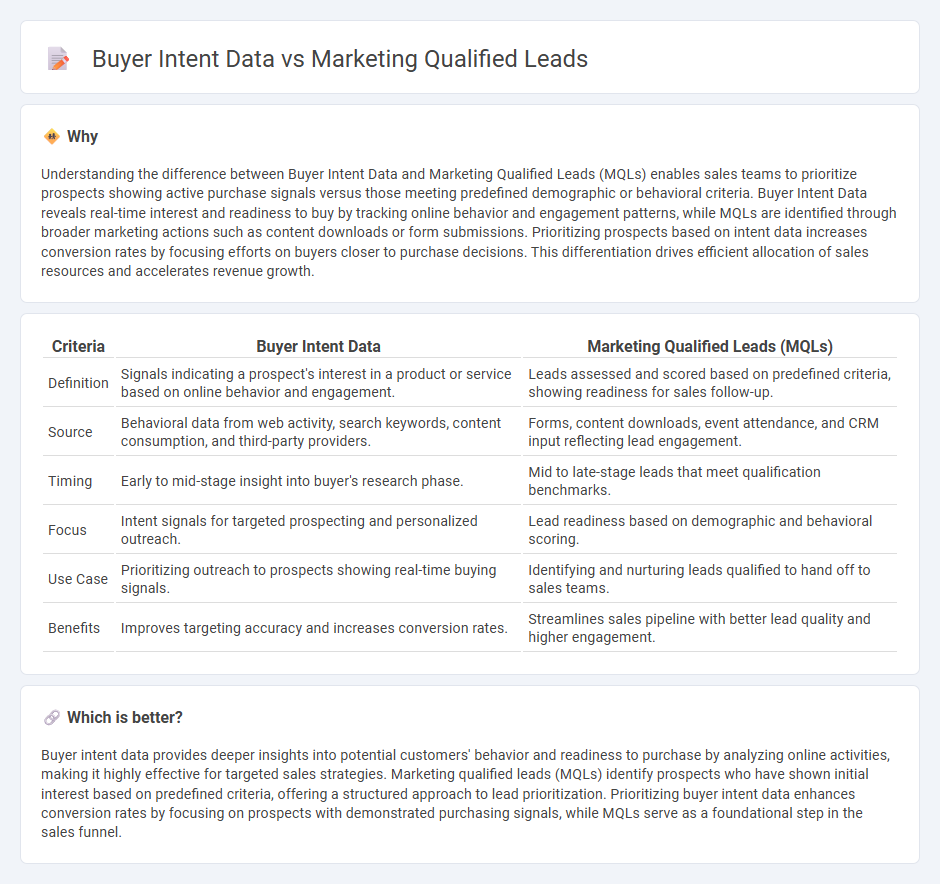
Buyer intent data reveals potential customers actively researching products or services, enabling sales teams to prioritize prospects demonstrating high purchase intent. Marketing qualified leads (MQLs) are individuals identified through engagement metrics like form submissions or content downloads, signaling interest but not necessarily readiness to buy. Explore how leveraging both buyer intent data and MQLs can optimize your sales strategy and drive revenue growth.
Why it is important
Understanding the difference between Buyer Intent Data and Marketing Qualified Leads (MQLs) enables sales teams to prioritize prospects showing active purchase signals versus those meeting predefined demographic or behavioral criteria. Buyer Intent Data reveals real-time interest and readiness to buy by tracking online behavior and engagement patterns, while MQLs are identified through broader marketing actions such as content downloads or form submissions. Prioritizing prospects based on intent data increases conversion rates by focusing efforts on buyers closer to purchase decisions. This differentiation drives efficient allocation of sales resources and accelerates revenue growth.
Comparison Table
| Criteria | Buyer Intent Data | Marketing Qualified Leads (MQLs) |
|---|---|---|
| Definition | Signals indicating a prospect's interest in a product or service based on online behavior and engagement. | Leads assessed and scored based on predefined criteria, showing readiness for sales follow-up. |
| Source | Behavioral data from web activity, search keywords, content consumption, and third-party providers. | Forms, content downloads, event attendance, and CRM input reflecting lead engagement. |
| Timing | Early to mid-stage insight into buyer's research phase. | Mid to late-stage leads that meet qualification benchmarks. |
| Focus | Intent signals for targeted prospecting and personalized outreach. | Lead readiness based on demographic and behavioral scoring. |
| Use Case | Prioritizing outreach to prospects showing real-time buying signals. | Identifying and nurturing leads qualified to hand off to sales teams. |
| Benefits | Improves targeting accuracy and increases conversion rates. | Streamlines sales pipeline with better lead quality and higher engagement. |
Which is better?
Buyer intent data provides deeper insights into potential customers' behavior and readiness to purchase by analyzing online activities, making it highly effective for targeted sales strategies. Marketing qualified leads (MQLs) identify prospects who have shown initial interest based on predefined criteria, offering a structured approach to lead prioritization. Prioritizing buyer intent data enhances conversion rates by focusing on prospects with demonstrated purchasing signals, while MQLs serve as a foundational step in the sales funnel.
Connection
Buyer intent data reveals potential customers' behaviors and interests, enabling precise identification of prospects likely to convert. Marketing qualified leads (MQLs) are generated by analyzing this data to prioritize high-intent prospects, streamlining the sales funnel. Integrating buyer intent data enhances MQL accuracy, increasing conversion rates and optimizing marketing ROI.
Key Terms
Lead Scoring
Marketing qualified leads (MQLs) are prospects identified based on demographic and behavioral criteria, indicating readiness for sales engagement, while buyer intent data captures real-time signals from potential buyers' online activities reflecting purchase intent. Lead scoring integrates both MQL attributes and buyer intent data to prioritize leads, enhancing accuracy in predicting conversion likelihood and optimizing sales efforts. Explore how combining lead scoring with buyer intent data transforms lead management for higher ROI.
Behavioral Signals
Marketing qualified leads (MQLs) are identified based on demographic and engagement criteria, but buyer intent data relies heavily on behavioral signals such as website interactions, content consumption, and search patterns to predict purchasing readiness. Behavioral signals provide real-time insights into prospect interests and readiness, enabling more accurate targeting and personalized marketing strategies. Explore how integrating buyer intent data with MQLs enhances sales effectiveness and accelerates conversion rates.
Conversion Readiness
Marketing qualified leads (MQLs) are prospects identified based on demographic and behavioral criteria indicating potential interest, while buyer intent data captures real-time signals reflecting a prospect's readiness to make a purchase. MQLs help prioritize contact efforts but may not fully reveal conversion readiness, whereas intent data leverages online activity and engagement patterns to pinpoint high-conversion opportunities more precisely. Explore how integrating these approaches can enhance your sales funnel efficiency and boost conversion rates.
Source and External Links
What is an MQL? A Guide to Marketing Lead Qualification - A Marketing Qualified Lead (MQL) is a prospect who has engaged with a brand's content and meets criteria such as having a need, budget, and authority to buy, making them more likely to become a customer.
What Is a Marketing Qualified Lead (MQL)? - An MQL is a potential customer identified by marketing as having a higher likelihood of converting, typically based on interactions like downloading content, attending webinars, or filling out forms.
What Is A Marketing Qualified Lead (MQL)? - An MQL is a lead who has shown interest in a brand's offerings through marketing efforts, with qualification criteria often customized by analyzing historical customer behavior and engagement patterns.
 dowidth.com
dowidth.com